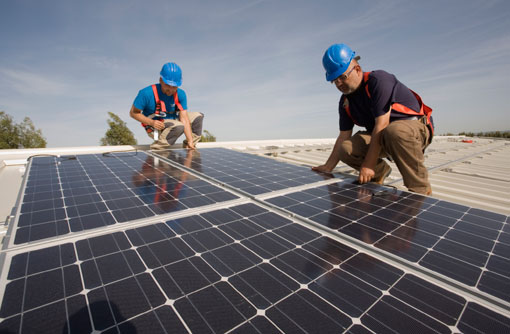Solar helps Welsh farm turn carbon neutral

An organic vegetable farm in west Wales has become one of the first carbon neutral farms in the country.
Blaencamel Farm previously relied on the National Grid to power its irrigation pumps, but is now harnessing its energy requirements from the sun. Thirty-nine 210W solar photovoltaic panels have been installed on a barn roof to create an 8.2kW system.
Grower Peter Segger has been a leader in environmentally sustainable farm practices for nearly four decades but is also a shrewd businessman.
When the government introduced Feed-in Tariffs last year to pay people and organisations for the “green” energy they generate from small-scale solar panels, he seized the opportunity to make his 20ha enterprise carbon neutral.
Solar energy had been his favoured alternative energy option but until the financial incentive of FiTs, the figures didn’t stack up.
He had previously visited Germany to research solar power and recognised there the benefits of government support. “Almost every barn roof in Germany is covered with solar panels. It was a fantastic and brilliant move by the UK government to offer similar support here,” said Mr Segger, who runs the business with his partner, Anne Evans.
It cost him £30,000 to install the high quality Kyocera KD210W solar PV panels but having already banked his first cash payment of £3,500, the system is on course to pay for itself and make a profit after about 10 years. His Feed-in Tariff contract extends over 25 years.
Renewable energy company Dulas, who supplied the panels, says that in the long term this revenue stream will be reliable because Mr Segger has opted for high performing panels that have undergone rigorous sequential testing. “Kyocera panels are the only panels to have passed the TUV Rheinland tests with flying colours,” says Laura Nairne, of Machynlleth-based Dulas.
Mr Segger says it is not the income from selling excess energy to the National Grid that is the money earner but the energy he is using. “We are paid 14p for every unit we produce so when you add up all those units of savings it is quite a significant figure,” he says.
The panels not only produce enough electricity to run the farmhouse and farm shop but have enabled the farm to modify its solar irrigation system using renewable energy to pump water around its 20ha of crops and an acre of greenhouses.
Electricity generated by the panels is also being used to help produce a new range of food products. “We used to do our processing at night when electricity was cheaper but we now do that during the day when the sun is shining,” Mr Segger explains.
The panels generate over 80% more electricity than the farm needs so the remainder is sold back to the grid.
Sustainability has been at the heart of the farm’s ethos for the last 36 years. “We have been committed to producing organic products since 1974 but came to realise that just being organic was not enough. We had to plan to make the business more resilient and sustainable so that when we pass it onto the children they won’t be in a position where they can’t afford to run it,” says Mr Segger.
He started by localising his markets, selling a wide range of produce to farmers’ markets, farm shops and restaurants instead the limited volume range he had been growing for supermarkets.
“We have always been an environmentally friendly operation but have recently ramped up our drive to becoming truly self-sustainable,” he explains.
Encouraged by the introduction of the Feed-in Tariff scheme, which provides cashback for all energy generated and enables any unused electricity to be sold back into the grid, Mr Segger approached Dulas for guidance.
He has been delighted with the results. “The panels have been a huge success for our business. I have never before invested that amount of money in something and not had a single issue,” says Mr Segger. “We can generate enough electricity to support our current farming activities and, because we produce more electricity than we need, we are looking at other ways to further develop the business.”
Mr Segger now hopes to convert his diesel tractor to run on electricity. “It is crucial that people see that renewable energy works and is accessible and affordable. Farmers need to be wise and anticipate the rising cost of energy, putting in place the systems they need while the government is still offering a financial incentive to do so. I encourage all farmers to act quickly. If you have the cash, invest it in your farm’s future and look into renewable energy,” he says.
